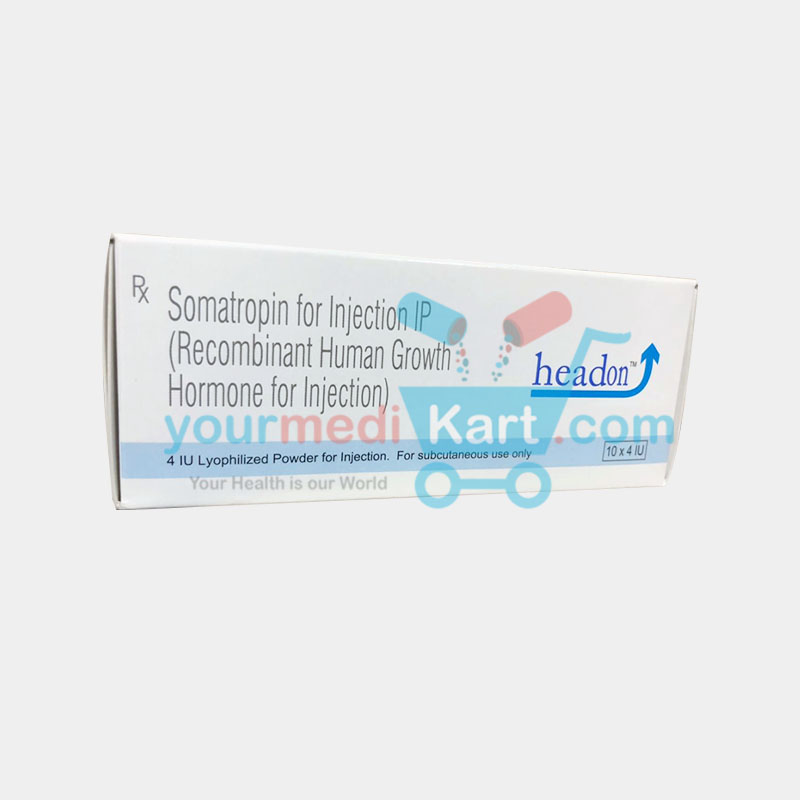What is Growth Hormone (Injection)
Growth hormone (GH), additionally called somatotropin or human growth hormone, peptide hormone discharged by the foremost flap of the pituitary gland. It invigorates the development of basically all tissues of the body, including bone. GH is synthesized and discharged by front pituitary cells called somatotrophs, which discharge somewhere in the range of one and two milligrams of the hormone every day. GH is indispensable for typical actual development in children; its levels rise progressively during childhood and top during the development spray that happens in puberty. Buy Growth Hormone Injection Online in India At Yourmedikart.store
In biochemical terms, GH invigorates protein synthesis and builds fat breakdown to give the energy important to tissue development. It also estranges (goes against) the activity of insulin. GH may act directly on tissues, but quite a bit of its impact is interceded by incitement of the liver and different tissues to deliver and deliver insulin-like development factors, fundamentally insulin-like development factor 1 (IGF-1; once called somatomedin). The term insulin-like development factor is derived from the capacity of high concentrations of these components to mirror the activity of insulin, although their essential activity is to invigorate development. Serum IGF-1 concentrations increase progressively with age in kids, with a sped up increment at the hour of the pubertal development spray. After puberty the concentrations of IGF-1 continuously decrease with age, as do GH concentrations.
GH discharge is invigorated by growth hormone-releasing hormone (GHRH) and is inhibited by somatostatin. Likewise, GH secretion is pulsatile, with floods in secretion happening after the beginning of profound rest that are particularly conspicuous at the hour of puberty. In typical subjects, GH emission expansions because of diminished food admission and to physiological burdens and diminishes in light of food ingestion. Notwithstanding, a few people are influenced by irregularities in GH discharge, which include either deficiency or excess of the hormone.
We understand that you may have a ton of inquiries when your child is diagnosed with growth hormone deficiency. Is it dangerous? Will it influence my child long term? What do we do next? We’ve tried to give a few answers to those inquiries here, and our specialists can clarify your kid’s condition completely.
What is Growth Hormone Deficiency?
Growth hormone deficiency is an unpredictable issue that can take various forms from one patient to another.
Growth hormone is a protein created by the pituitary gland, which is situated close to the foundation of the brain and attached to the hypothalamus (a piece of the cerebrum that assists with managing the pituitary organ). On the off chance that the brain organ or the hypothalamus is distorted or harmed, it might imply that the pituitary gland can’t create growth hormone..
If the pituitary gland is deficient in various pituitary hormones, the condition is called hypopituitarism.
Growth Hormone deficiency is regularly treated with injections of Growth Hormone. For quite a long time, nonetheless, availability of the hormone was limited, because it was acquired exclusively from human dead body pituitaries. In 1985, use of natural GH was halted in the United States and a few different nations due to the possibility that the hormone was contaminated with a type of pathogenic agent known as a prion, which causes a lethal condition called Creutzfeldt-Jakob infection. That same year, through recombinant DNA innovation, researchers had the option to deliver a biosynthetic human form, which they called somatrem, along these lines guaranteeing an essentially limitless stock of this once-valuable substance.
Children with GH deficiency react well to injections of recombinant Growth Hormone, frequently accomplishing close ordinary stature. Nonetheless, a few kids, principally those with the innate powerlessness to combine GH, create antibodies in light of injections of the hormone. Children with short height not related with GH deficiency may also fill because of growth hormone injection, although large dosages are regularly required.
An uncommon type of short height is brought about by an acquired cold-heartedness toward the activity of GH. This problem is known as Laron dwarfism and is portrayed by strange GH receptors, coming about in diminished GH-stimulated production of IGF-1 and poor growth. Serum GH focuses are high a result of the shortfall of the inhibitory activity of IGF-1 on GH secretion. Dwarfism may also be brought about by inhumanity of bone tissue and different tissues to IGF-1, coming about because of diminished capacity of IGF-1 receptors.
Growth Hormone Causes
Damage to the pituitary gland or nerve center might be the aftereffect of a strange development that happened before your kid was conceived (innate) or something that happened during or after birth (obtained).
Inborn growth hormone deficiency can happen if there are transformations in qualities for factors that are significant in pituitary gland development, or in receptors and elements (including growth hormone) along the growth hormone pathway; until this point, notwithstanding, the reason for a large portion of these cases is obscure.
Acquired causes of growth hormone deficiency include:
- a brain tumor in the hypothalamus or pituitary
- head injury
- radiation treatment for cancers, if the therapy field includes the hypothalamus and pituitary
- infections that invade the hypothalamus or its association with the pituitary gland, like histiocytosis
- an immune system condition (lymphocytic hypophysitis)
It’s also critical to recollect that growth hormone deficiency is just one of many conditions that may influence your child’s growth. Your kid’s short height might be brought about by different conditions, and development disappointment might be because of diminished wholesome admission, gastrointestinal issues, infections that have expanded metabolic interest or hypothyroidism.
Growth Hormone Symptoms
Since growth takes place over many years, and since children grow at different rates, symptoms of growth hormone deficiency may be hard to identify. In addition to noticeably slow growth with normal body proportions, signs may include:
- immature appearance, compared to peers
- a chubby body build
- a prominent forehead
- an underdeveloped bridge of the nose
Growth hormone deficiency has no affect on a child’s intelligence.
These symptoms may resemble other conditions, so be sure to always consult your child’s physician for a diagnosis.

